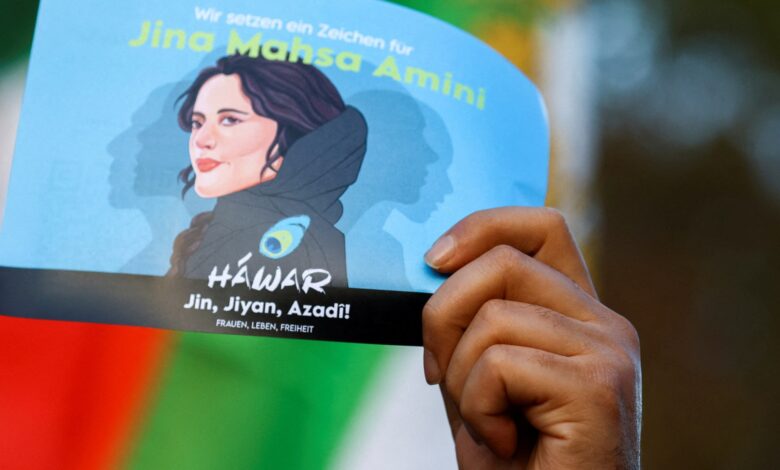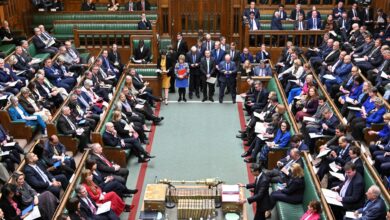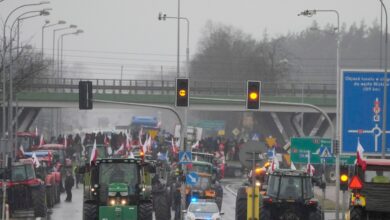Iran committed crimes against humanity during protest crackdown, UN says

United Nations mission finds Iranian authorities committed murder, torture, rape and other crimes in the crackdown.
Tehran’s violent crackdown on peaceful protests and discrimination against women and girls triggered serious rights violations, many amounting to crimes against humanity, a United Nations fact-finding mission has concluded.
Iran was rocked by widespread demonstrations set off by the September 2022 death of Mahsa Amini, a 22-year-old Iranian Kurd who had been arrested for allegedly violating the strict dress rule for women.
Anger over her death rapidly expanded into weeks of taboo-breaking protests in an open challenge to Iran’s system of government under supreme leader Ayatollah Ali Khamenei.
In November 2022, the UN Human Rights Council created a high-level investigation into the deadly crackdown.
In its first report, the independent international fact-finding mission on Iran said on Friday that many of the violations uncovered “amount to crimes against humanity – specifically those of murder, imprisonment, torture, rape and other forms of sexual violence, persecution, enforced disappearance and other inhumane acts”.
It added that the committing of such crimes, in the context of a deprivation of fundamental rights and inflicted with discriminatory intent, “leads the mission to the conclusion that the crime against humanity of persecution on the grounds of gender has been committed”.
“These acts form part of a widespread and systematic attack directed against the civilian population in Iran, namely against women, girls, boys and men who have demanded freedom, equality, dignity and accountability,” said Sara Hossain, who chairs the three-member mission.
“We urge the government to immediately halt the repression of those who have engaged in peaceful protests, in particular women and girls.”
‘Obfuscated the truth’
Rather than conducting a proper investigation into Amini’s death, Tehran “actively obfuscated the truth”, the mission said.
The mission said people “who merely danced” or honked car horns were arrested in the crackdown on protests, while hundreds of children, some as young as 10, were also detained.
The mission found the Iranian security forces used unnecessary and disproportionate force, resulting in the unlawful killing and injuries of protesters who posed no imminent threat of death or serious injury.
Dozens of people were blinded, the mission added, saying it also found evidence of extrajudicial killings.
The mission found Tehran had arbitrarily executed at least nine young men from December 2022 to January 2024, while dozens remain at risk of execution or a death sentence in relation to the protests.
Credible figures suggest that as many as 551 protesters were killed by the security forces, among them at least 49 women and 68 children, the mission said, with most deaths caused by firearms.
“Pervasive and deep-rooted structural and institutionalised discrimination against women and girls … was both a trigger and an enabler of the widespread serious human rights violations and crimes under international law,” the report concluded.
“Given the gravity of its findings, the mission urges the Iranian authorities to halt all executions and immediately and unconditionally release all persons arbitrarily arrested and detained in the context of the protests or for non-compliance with or advocacy against the mandatory hijab.”
Iran should stop the judicial harassment of protesters and their families, repeal laws that discriminate against women, “in particular those on the mandatory hijab”, and disband the “persecutory system” of its enforcement, it said.
The mission urged Tehran to provide “justice, truth and reparations” to victims of rights violations in connection with the protests.
It also said countries should explore avenues for legal accountability outside Iran, given the absence of effective remedies within the country, and that other states should also grant asylum and humanitarian visas to people fleeing persecution for defending rights in Iran.
The Iranian authorities refused to cooperate with the mission.
The report will be formally presented to the Human Rights Council on March 15.
The release of the report is unlikely to change the trajectory of Iran’s government, now more firmly in the hands of hard-liners after a low-turnout vote last week put them back in charge of the country’s parliament.
However, it has provided further international pressure on Tehran amid wider Western concerns about its advancing nuclear programme, Iran’s arming of Russia in Moscow’s war on Ukraine and the continued harassment and imprisonment of activists, including Nobel Peace Prize laureate Narges Mohammadi.



